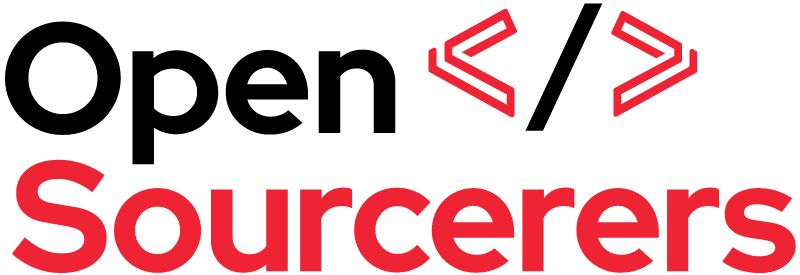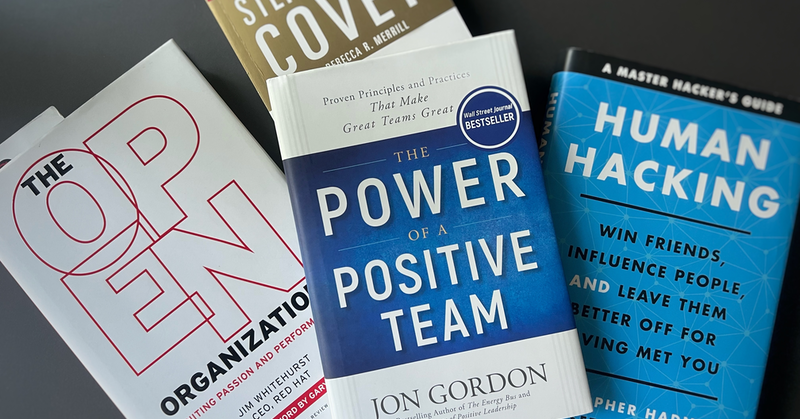I have been in a variety of technical leadership positions over the past decade before transitioning into people management in 2019. During my journey I’ve attended numerous formal leadership trainings, read dozens of books, and frequently studied online resources (The Enterprisers Project and Harvard Business Review are my favorites by the way). There is so much great content out there that can help you to become a better leader but it’s stressful and time consuming to find content that matters.
That is why I would like to present my highlights: those books which really stood out to me and had a significant impact on my success as a leader.
Bringing open leadership into practice

The Open Organization
What is the book about?
In the first half of my career, I had been working in companies with a top-down directive leadership style. When I joined my current company (Red Hat), this is when I realized that there are different approaches to taking decisions, generating new ideas, and implementing them in a global enterprise with thousands of employees. To a certain extent I felt completely overwhelmed and a little puzzled about how this new way of operating worked. Then Jim published his book “The Open Organization”, which opened my eyes. The book essentially taught me the principles of my current leadership style. For sure I have been adding my twist to it, but I can proudly say that I still use Jim’s principles on a daily basis.
My key learnings
- As a leader, it is crucial to consistently study and experience different organizational styles (Reinventing Organizations provides an excellent overview)
- There are other (better) ways to lead, inspire and motivate people than practicing top-down approaches
- Intrinsic motivation will ignite passion in people. This in turn will automatically lead to better results and business success.
- Accept the feeling that you cannot control/measure everything; though this contradicts classic management styles. Instead, focus on putting trust in your associates.
- Start with the WHY and give people context about your own and the organization’s aspirations. The HOW and WHAT will come automatically. Simply focus on putting trust in your associates. They will do the right thing.
Trust is the foundation for every relationship

Speed of Trust
What is the book about?
I think you will fully agree that “trust” is crucial in all aspects of your private and business life. And I am pretty sure that you have a gut feeling to measure your trust in a person. But how can you define trust and its impact? How can you make it measurable and even teach others how to build up trust? – Well I was struggling with these questions for a long time until “Speed of Trust” introduced me to the mechanics of trust.
The book will make you aware of the different levels of trust and secondly, provide you with practical behaviors (including examples) on how to build & extend trust.
My key learnings
- I love these two metaphors to describe what trust is:
- Imagine a relationship to a person as a tree that is growing over time; leaves and branches represent results/capabilities and grow over time. You can compare trust to the roots of your tree. They are the foundation for your relationship and provide the necessary stability if a storm approaches.
- Another way to look at trust is to compare it with a bank account. Behaviors that build trust, will deposit money into your account. Money will get withdrawn from your account if you don’t show up and vice versa. What will happen if the account turns negative?
- Taxes of not having trust (in a business context): lack of speed, higher costs, politics, bureaucracy, disengagement
- Dividends of having trust: innovation, collaboration, loyalty, better execution
- My highlights from the “13 Behaviors of High Trust”, which have the highest impact
- Always be transparent and talk straightly
- Clarify expectations upfront and tell people about your aspirations/goals (the WHY; see above)
- Demonstrate accountability and deliver against your commitments
Influencing should be considered as a way to create win-win situations

Human Hacking
What is the book about?
As a leader, you have to deal with other human beings a lot. According to my personal experience being a people manager for a couple of years now, communication skills and empathy are the keys to success. In this respect, the title of my third recommendation might read a bit controversial at first glance: “Human Hacking”. Chris explains to you how to “make friends, influence people, and leave them feeling better for having met you by being more empathetic, generous, and kind.” He essentially introduces you to all relevant aspects of human communication, relevant psychological aspects of relationships and to techniques, bad people might use to manipulate you.
Therefore this book is an absolute must-read for improving your relationship with friends, colleagues, business partners, and customers.
My key learnings
- Understand and acknowledge that there are different communication styles and adapt your message accordingly. I recommend the DISC model, which gives you a simple approach to detecting a certain style.
- Building rapport is crucial as a first step to connecting with others. This practically means creating a common ground and connecting emotionally with others. Most importantly the experience of others must be your top priority.
- Influence translates into others wanting to help you. This may be achieved through reciprocity, suspending your ego, and being likable & kind.
- Be sensitive to manipulation techniques; such as others leaving you in uncertainty, consistently taking away control from you, questioning your beliefs, and things you have been taught.
- Always strive to create win-win situations in your interactions and adhere to Robin Dreeke‘s mantra → „Leave them better off for having met you!“
There is no other option than having a positive attitude

Power of a positive team
What is the book about?
I am pretty sure you have heard the saying “glass half-empty or half-full?”, haven’t you? In case you are a fact oriented person, you might argue that the “glass has 250 ml of fluid in itself which equals 50% of its capacity“. In fact it depends on your viewpoint how you see the glass. When I translate this metaphor to business I could say that a difficult conversation could be seen as a hurdle / obstacle or as an opportunity to grow. I truly believe that the so-called „growth mindset“ is the best way we should see our world.
This includes having a positive attitude in general and also spreading positivity to others around you. In his book „Power of a positive team“ Jon tells you many stories of how powerful this type of mindset can be; from sports to business. Moreover he shares a lot of practical tips and techniques which allow you to incorporate positivity into your daily routine and interaction with coworkers.
My key learnings
- “Culture eats strategy”; if you do not get the foundation right, the best strategy is meaningless
- Positivity is an attitude and it is contagious. It possesses the power to create value. On the other hand a lack of positivity (or even negativity) will limit your team’s abilities. You as a leader must lead by example here.
- Moreover it is crucial to establish a shared vision (“North Star”) and a greater purpose built on top of a good cultural foundation
- “One person can’t make a team, but one person can break a team.” → You must not ignore negativity, because it easily spreads. Instead you must confront the roots, transform them or remove them. This might also include tough conversations with your associates.
- If you establish a culture of positivity, chances are great that conflict is seen as a constructive and value generating event.
- Focus all your energy on your associates and the build of a positive team. Results (and business value) will come automatically. Try to acknowledge winning as a by-product of your effort to build a great team. – I know that this might be hard for some of you!
What you should take away
Putting together the key messages of these books with my own experience as a leader, I can confidently say that this equation will help you on your journey becoming a better leader:
Openness x Trust x Influencing x Positivity = Excellent Leadership
I am looking forward to you reading one of these books, incorporating the good practices presented, becoming a better leader and eventually creating a positive impact on people, organizations and our society.
Credits
A huge shoutout to my dear colleagues who recommended the books to me:
- Human Hacking → Tobias Held
- Speed of Trust → Matthias Kranz
Power of a positive team → Jürgen “Buddy” Hoffmann

